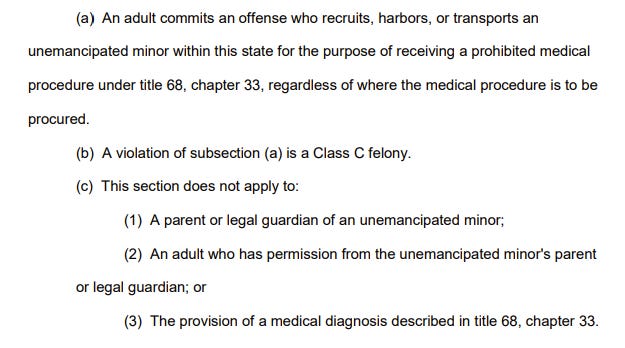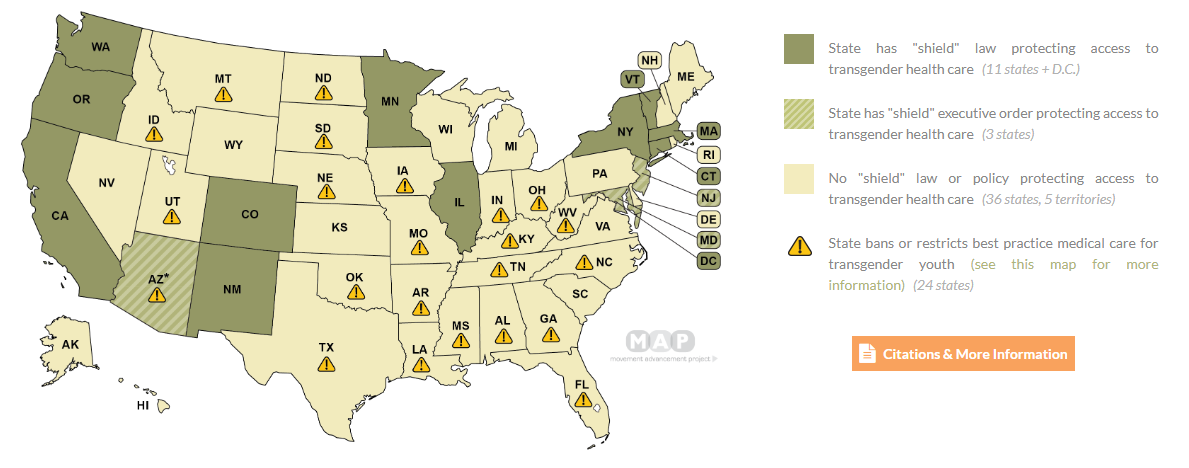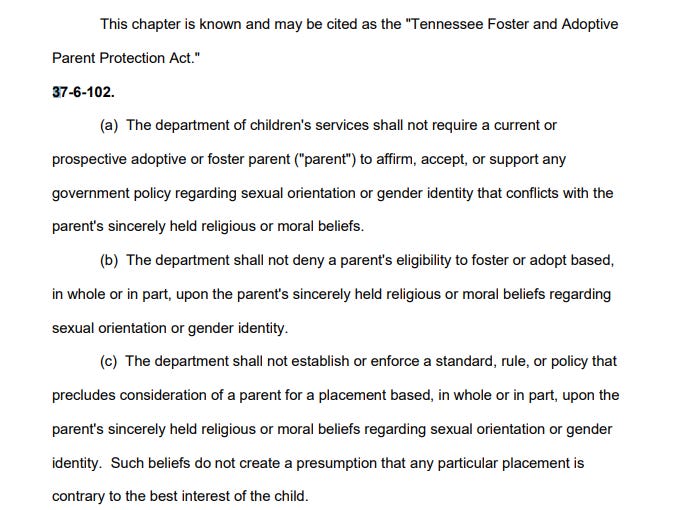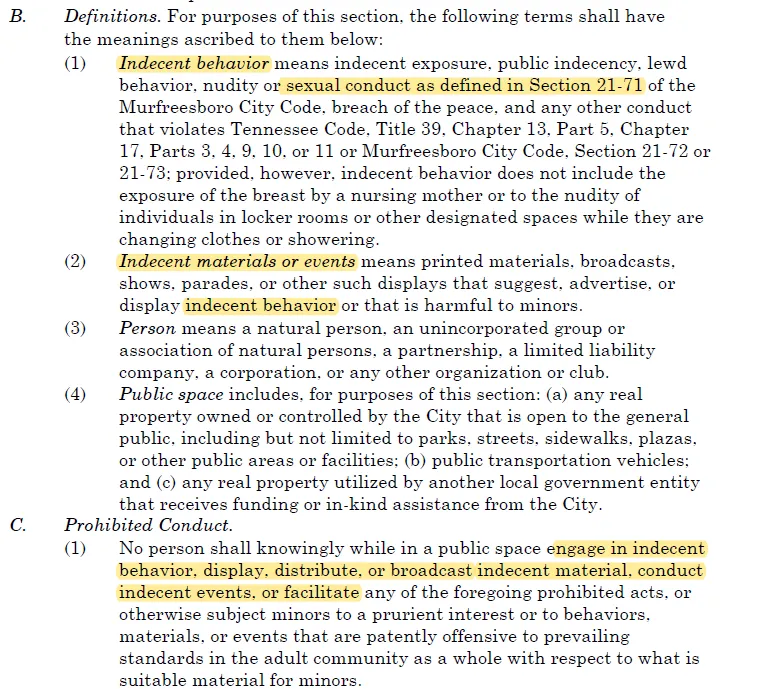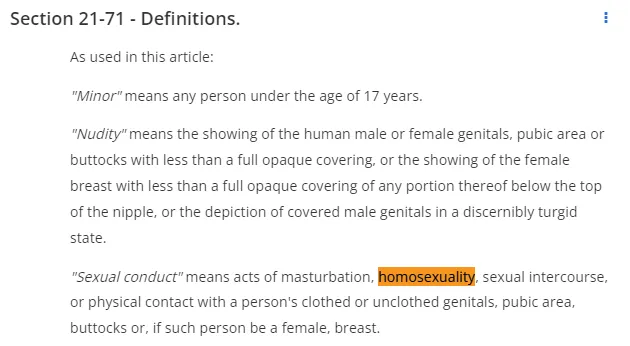Tennessee
New law restricts funding to schools allowing Trans students to play sports
“Telling transgender students that they can’t participate as who they really are amounts to excluding them from sports entirely”

NASHVILLE – Republican Governor Bill Lee signed a bill last Friday that allows for the withholding of state funds from any Tennessee school districts that don’t comply with the trans-exclusionary law Lee signed in March of 2021, Senate Bill 228.
The law, S.B. 228, bans trans children from participating on middle and high school sports teams that match their gender by requiring student athletes to prove the sex they were assigned at birth with an “original” birth certificate or other forms of proof.
Written into the language of the law, Tennessee’s Department of Education would withhold a portion of state funds from local school districts that fail to determine a student’s gender for participation in middle or high school sports. The measure does not specify exactly how much money should be withheld by the state.
“Telling transgender students that they can’t participate as who they really are amounts to excluding them from sports entirely – depriving them of opportunities available to their peers and sending the message that they are not worthy of a full life,” said Henry Seaton, ACLU of Tennessee’s transgender justice advocate, in a statement.
Last Fall, The American Civil Liberties Union (ACLU), the ACLU of Tennessee and Lambda Legal filed the lawsuit on behalf of Luc Esquivel, a 14-year-old boy from Knoxville, in the U.S. District Court for the Middle District of Tennessee, arguing that the law is discriminatory and unconstitutional.
Tennessee lawmakers are also advancing a separate bill that would ban transgender athletes from participating in female college sports. Republicans have also pushed another measure to let teachers and school districts use the pronoun that a transgender student does not prefer, exempting teachers from facing employment punishment and protecting schools from civil liability. Both proposals are expected to clear the General Assembly, the Associated Press reported.
Governor Lee has signed legislation that restricts funding to schools that allow transgender students to play sports.
— Human Rights Campaign (@HRC) April 24, 2022
Trans kids in Tennessee: you're loved and you're perfect just as you are. https://t.co/PGKNzyiJ4o
Tennessee
Federal judge refuses to dismiss trans kid’s suit against Tennessee
The case involves a 9-year-old trans child who was male at birth but identifies as female & Williamson County Schools

By Sam Stockard | NASHVILLE, Tenn. – A challenge of Tennessee’s law dealing with the use of public school restrooms and locker rooms by transgender students remains alive after a federal judge declined to dismiss all claims against the state education department and Williamson County Schools.
U.S. District Court Judge William Campbell denied the state’s request in to dismiss the child’s claim of a violation of rights under the Equal Protection Clause.
The judge, however, granted a request to dismiss the child’s claim that her Title IX rights were violated. The ruling notes that because the federal law allows schools to maintain separate restrooms for “the different sexes,” requiring the child to use the restroom based on her biological sex doesn’t violate Title IX.
The judge also dismissed the child’s request to correct all records to reflect her female gender.
Tennessee lawmakers have taken steps in recent years to prevent transgender athletes from playing sports based on their sexual identity. The Legislature enacted restrictions in 2023 on transgender medical treatment and this year adopted a bill preventing adults other than parents and guardians from taking children outside the state for transgender care.
The case against the Tennessee Department of Education and Williamson County Schools involves a 9-year-old transgender child who was male at birth but identifies as female, according to court filings. The child uses “she/her” pronouns and lives socially as a girl by wearing her hair long and dressing in a manner usually associated with girls.
The complaint was brought by a friend and the child’s parents when the child was 8, claiming the Williamson County elementary school she attends requires her to use a single-occupancy restroom, not the multi-use girls’ restroom.
The child claims the school’s “insistence” that she use a separate restroom “isolates her and distinguishes her from her classmates and exacerbates the stress and anxiety she experiences while trying to fit in and avoid being stigmatized on the basis of her sex and gender identity.” The child also claims the restroom designated for her has problems with distance from her class, safety and cleanliness.
The Tennessee Legislature passed the Tennessee Accommodations for All Children Act in May 2021, requiring public schools to provide a “reasonable accommodation” to students, teachers and employees who want “greater privacy when using a multi-occupancy restroom or changing facility designated for [their] sex and located within a public school building.”
“Reasonable accommodations” include single-occupancy restrooms or changing facilities or use of an employee restroom or changing facility.
The “reasonable accommodations” don’t include restrooms or changing areas designated for use by members of the opposite sex while the opposite sex is present or could be present. They also don’t require remodeling or structurally changing a school facility, or limiting access to a restroom or changing room designated for use by members of the opposite sex if that creates a violation or state or local building codes.
The new state law defines sex as “a person’s immutable biological sex as determined by anatomy and genetics existing at the time of birth.” It also provides students, parents, guardians, teachers and employees the right to sue public school systems for “psychological, emotional, and physical harm,” including monetary damages, legal fees and costs if they “encounter a member of the opposite sex in a multi-occupancy restroom or changing facility located in a public school building … [and] the public school intentionally allowed a member of the opposite sex [defined as sex at birth] to enter the multi-occupancy restroom or changing facility while other persons were present.”
Campbell denied the child’s request for an injunction against the school district to stop it from enforcing the state law.
Yet the judge opted not to dismiss the child’s claims under the Equal Protection Clause, which prohibits a state from “denying to any person within its jurisdiction the equal protection of the laws” and prevents government discrimination that “either burdens a fundamental right, targets a suspect class or intentionally treats one differently than others similarly situated without any rational basis for the difference.”
The judge’s ruling points out that classifications by the government based on sex are recognized as “a quasi-suspect classification subject to intermediate scrutiny.”
******************************************************************************************

Sam Stockard is a veteran Tennessee reporter and editor, having written for the Daily News Journal in Murfreesboro, where he served as lead editor when the paper won an award for being the state’s best Sunday newspaper two years in a row. He has led the Capitol Hill bureau for The Daily Memphian. His awards include Best Single Editorial and Best Single Feature from the Tennessee Press Association.
******************************************************************************************
The preceding article was previously published by the Tennessee Lookout and is republished with permission.
Now more than ever, tough and fair journalism is important. The Tennessee Lookout is your watchdog, telling the stories of politics and policy that affect the people of the Volunteer State.
We’re part of States Newsroom, the nation’s largest state-focused nonprofit news organization.
Tennessee
Tennessee: Anti-LGBTQ parents can now foster, adopt LGBTQ kids
Advocates have pushed back to say that plain language of the law does not require the state to take into account the child’s own wishes

By Anita Wadhwani | NASHVILLE, Tenn. – With Gov. Bill Lee’s signature, Tennessee last week became the first state in the nation to establish the right of adults who claim moral or religious objections to LGBTQ identity to foster and adopt LGBTQ kids.
In the days since the law became effective, the Department of Children’s Services (DCS) has shelved a 10-year-old policy that said children in state custody must receive care that “promotes dignity and respect for all children/youth and families inclusive of their gender identity, gender expression and sexual orientation.”
That policy is now “under review and will be updated on the web site once the review is complete,” DCS spokesperson Ashley Zarach said. New guidelines for how the state will navigate foster kids’ sexual orientation and gender identity in deciding where to place them are expected to be hashed out in the coming months.
The law’s passage has raised alarms among advocates for LGBTQ youth in Tennessee and elsewhere, who say it upends a central principle of child welfare systems: prioritizing the best interest of a child.
Instead, they say, the law gives gives greater weight to a prospective parent’s religious and moral beliefs over the need of a child for a loving, safe and supportive home.
“What’s really sad about this is there’s a really high volume of LGBTQ+ kids in the foster system whose needs aren’t being met now,” said Molly Quinn, executive director of OUTMemphis. Among the LGBTQ nonprofit’s programs is one that aids 18- to 24-year-old LGBTQ youth facing homelessness, many of whom are former foster kids who faced a tough time in the child welfare system.
“The fact that the state would accept a family that is willing to discriminate into this broken system with such vulnerable kids is difficult to understand,” she said.
Best interests of the child?
The law, formally called the Tennessee Foster and Adoptive Parent Protection Act, was backed overwhelmingly by Tennessee Republican lawmakers, who two years ago also approved a first-of-its-kind law allowing private adoption and foster care agencies that accept tax dollars to reject prospective parents for a variety of religious or moral reasons, including their faith or whether they are LGBTQ.
“In advocating for this year’s bill, Dickson Republican Rep. Mary Littleton characterized it as a necessary safeguard for families who want to offer loving homes to foster and adoptive kids but worry that they would have to compromise their faith or moral beliefs. Littleton also cited an urgent need for more willing families to step forward. Tennessee currently has 4,948 fully approved foster homes, but needs 400 more.
At the end of the day the state should be acting in the best interest of the kids and this doesn’t do this. This puts emphasis on beliefs of foster and adoptive parents.” – Laura Brennan, Family Equity
Littleton stressed that the new law says DCS is not precluded from taking a child’s preferences into account before placing them in a home.
“This bill does not disregard the values and beliefs of the child,” Littleton said, noting state child welfare officials can still take into account “a comprehensive list of factors.” before placing any child in any home.
Advocates have pushed back to say that plain language of the law does not require the state to take into account the child’s own wishes.
They also criticized what they call a mischaracterization by the law’s supporters that prospective foster and adoptive parents in Tennessee have been rejected for holding anti-LGBTQ beliefs.
Parents in Tennessee have not been required to be gender- or sexual-orientation-affirming as a condition of becoming approved as a foster or adoptive parent. They have, however, been required to promote dignity and respect of a child’s identity if they take an LGBTQ kid in their home — until now.
DCS: parents preferences already taken into account
According to the Department of Children’s Services, prospective parents’ “preferences” have routinely been taken into account before a child is placed in a home, a spokesperson for the Department of Children’s Services said in a statement.
“Prior to this legislation, the DCS home study process included asking prospective foster and adoptive parents a series of questions to identify their placement preferences,” a statement from DCS said.
“Among those are questions regarding willingness to parent a child who identifies as LGBTQ+. Our goal always is to find the most appropriate placement to meet the unique needs of each child in our care,” the statement said.
Tennessee currently has 8,854 kids in state custody — 6,686 of them residing in foster homes. Up to a third of all foster youth nationwide identify as LBGTQ — often kicked out of home or winding up in state custody as a result of mistreatment or rejection based on their gender identity, according to the U.S. Department of Health and Human Services.
Jace Wilder, education manager Tennessee Equality Project, an LGBTQ+ advocacy organization that has vocally opposed the law, pointed to his own tough childhood as an example of the importance of supportive adults in a child’s life.
Wilder, who is transgender, was raised, in part, by a friend’s parents after suffering abuse at the hands of his father, he said. His mother was disabled and frequently hospitalized.
Wilder said the abuse wasn’t solely because of his gender identity, but “it kind of gave him more ammo to use against me, so that did not help.” He was also able to connect with LGBTQ people for support in his teens and college years, he said.
“Without finding people that accepted me and really helped me grow, I think I would have been stuck in the position of being too afraid to transition, too afraid of being out.” he said. “I think this puts kids at risk of being abused, neglected and harmed again.”
The nature of discourse over LGBTQ youth in Tennessee already exemplifies the need for safe and affirming homes, said Eli Givens, a college freshman from Tennessee who also serves as an advocate for the Tennessee Equality Project.
“It’s been just really unbelievable watching this session,” Givens said. “I’ve had adults telling me I need to go gas myself, that I was clearly molested when I was younger, just a wide array of threats,” they said.
“It’s bewildering that the same adults who told me to gas myself can adopt an LGBTQ child. That’s an extremely scary reality.”
Tennessee AG pushes back on proposed federal LGBTQ foster protections
The law was enacted on the heels of proposed new rules currently being considered by the U.S. The Department of Health and Human Services related to the placement of LGBTQI+ youth in foster care. Among the proposed rules for all foster homes is they “establish an environment free of hostility, mistreatment, or abuse based on the child’s LGBTQI+ status.”
In November, Tennessee Attorney General Jonathan Skrmetti led a 17-state coalition opposing the rules, saying in a letter to the federal government that they would shrink the pool of available foster families and “further divert resources away from protecting foster children from physical abuse and toward enforcing compliance with controversial gender ideology.”
Laura Brennan, associate director for child welfare policy for Family Equality, which advocates for LGBTQ families, said national advocates are keeping a close eye on what’s happening in Tennessee. The state’s 2022 law allowing publicly-funded private adoption and foster care agencies to exclude LGBTQ parents has seen been adopted by 13 other states, she said.
“At the end of the day the state should be acting in the best interest of the kids and this doesn’t do this,” she said. “This puts emphasis on beliefs of foster and adoptive parents.”
******************************************************************************************

Anita Wadhwani is a senior reporter for the Tennessee Lookout. The Tennessee AP Broadcasters and Media (TAPME) named her Journalist of the Year in 2019 as well as giving her the Malcolm Law Award for Investigative Journalism. Wadhwani is formerly an investigative reporter with The Tennessean who focused on the impact of public policies on the people and places across Tennessee.
******************************************************************************************
The preceding piece was previously published by the Tennessee Lookout and is republished with permission.
Now more than ever, tough and fair journalism is important. The Tennessee Lookout is your watchdog, telling the stories of politics and policy that affect the people of the Volunteer State.
We’re part of States Newsroom, the nation’s largest state-focused nonprofit news organization.
Tennessee
Tennessee lawmakers: “Recruiting” for trans youth care a felony
The bill was passed alongside an abortion bill that would make it illegal for adults to help minors obtain abortions without parental consent

By Erin Reed | NASHVILLE, Tenn. – The Republican-controlled Tennessee Senate passed a bill Thursday that would make it a felony to help a transgender youth obtain gender-affirming care.
Read broadly, the bill could apply even to those providing information about healthcare resources and laws in other states to youths in Tennessee. The bill borrows old language from anti-gay rhetoric of decades past around “recruiting” to further clamp down on information given to transgender youth about healthcare.
It signals a new phase in the fight over transgender care in the United States, potentially having nationwide repercussions and pitting the state against others that have passed shield laws protecting patient healthcare from out of state investigations.
The bill is Senate Bill 2782. The language of the bill was amended before its passage Thursday, stating that any adult who “recruits, harbors, or transports” a minor in Tennessee for the purpose of gender-affirming care could be guilty of a Class C felony, which carries a prison sentence of three to 15 years.
Read broadly, it could prohibit discussing healthcare options available in other states with transgender youths or providing maps of “safe states” for transgender healthcare to a transgender youth, though some legal experts say that this reading is constitutionally dubious and could violate first amendment protections.
You can read the amended bill here:
The bill is not the first to target transgender people, although it is the first to specify that it applies over state lines. Some gender affirming care bans in the United States have also banned “aiding and abetting” gender affirming care, such as in Mississippi and Iowa. Those bans have sparked concern that even counselors, voice therapists, and LGBTQ+ organizations could be targeted for “aiding and abetting” transgender youth obtaining care.
The Tennessee bill was passed alongside an abortion bill that would make it illegal for adults to help minors obtain abortions without parental consent, also dubbed an “abortion trafficking” law.
If passed, Tennessee would become only the second state to enact such a law after a similar one in Idaho was blocked in court. The Idaho law uses identical language, barring “recruiting, harboring, or transporting” a pregnant minor seeking an abortion. Together, these laws represent the latest in the cross-pollination between attacks on gender-affirming care and reproductive freedom that have become increasingly common in recent years.
This has in turn led to several states passing “safe state,” “shield,” or “sanctuary” laws for transgender people and those seeking or providing abortions or gender-affirming care. Currently, 15 states have enacted legislation or policies declaring themselves “sanctuary states” for gender-affirming care and reproductive healthcare
. These shield laws assert that other states cannot subpoena healthcare legally provided within their borders, and that they maintain jurisdiction over their own territories. These shield laws have already made an impact; Texas Attorney General Ken Paxton recently attempted to subpoena medical records from Seattle Children’s Hospital, which informed him that it could not comply due to Washington’s shield law.
You can see a state map of shield laws currently in effect here:
The fight over transgender rights is spilling into a battle over jurisdictional issues that have not been litigated in over a century and a half. In response to a recent proposal in Maine to pass a shield law, 16 Republican attorneys general signed a letter authored by the AG of Tennessee stating their intention to sue Maine if they pass a law that would bar complying with requests for patient healthcare information from across state lines.
A similar letter, written by Indiana Attorney General Todd Rokita and signed by 18 Republican AGs, announced similar opposition to shielding abortion records. In response, the Maine Legislature passed LD227, making it the potential 16th state to enact such a shield law, despite legal threats from Republican states like Tennessee.
The Tennessee bill is slated for a subcommittee hearing on April 16th. If the bill passes, there could be a showdown between the state and other states that have acted to protect their transgender citizens and citizens seeking abortions. Likewise, there could be an enormous chilling effect on providing information about transgender healthcare to minors in the state.
****************************************************************************

Erin Reed is a transgender woman (she/her pronouns) and researcher who tracks anti-LGBTQ+ legislation around the world and helps people become better advocates for their queer family, friends, colleagues, and community. Reed also is a social media consultant and public speaker.
******************************************************************************************
The preceding article was first published at Erin In The Morning and is republished with permission.
Tennessee
Tenn. bill passes, allows non-accepting parents adopt LGBTQ+ kids
The bill may allow parents to adopt or foster LGBTQ+ kids and put them through conversion therapy, according to advocacy organizations

By Erin Reed | NASHVILLE, Tenn. – On Monday evening, Tennessee passed a bill allowing parents with “religious or moral beliefs” that being LGBTQ+ is wrong to adopt LGBTQ+ children.
This bill could expose these children to harmful practices such as conversion therapy or familial rejection of their gender identity or sexuality. If signed into law, it could also come into conflict with federal rules that require safe placements for LGBTQ youth. The bill now goes to Governor Bill Lee’s desk, amid calls from leading LGBTQ+ organizations for a veto.
Senate Bill 1738, which passed on a party-line vote of 73-20, states that prospective foster parents cannot be required to “affirm, accept, or support” any policy regarding sexual orientation or gender identity if it conflicts with their “religious moral belief.”
Furthermore, the bill mandates that non-affirming foster parents have access to LGBTQ+ children for fostering or adoption. It asserts that beliefs “regarding sexual orientation or gender identity… do not create a presumption that any particular placement is contrary to the best interest of the child.”
See the relevant provisions here:
Under this bill, Tennessee would be prohibited from deeming parents unfit for adoption if they reject transgender youth, believing such identities to be sinful. Similarly, the state would be required to allow parents who are religiously or morally opposed to homosexuality to adopt gay children.
If a parent believes that conversion therapy through their church can “cure” LGBTQ+ identification, this belief cannot be considered contrary to the best interest of an LGBTQ+ child. The bill risks exposing every LGBTQ+ child in the state to potential religious abuse, conversion therapy, and family rejection.
This could be particularly harmful given the high overrepresentation of LGBTQ+ youth in the foster care system. For example, studies indicate that 30% of youth in the foster care system identify as LGBTQ+, and 5% as transgender.
Many of these youth have faced rejection or abuse from their families of origin. They are also more likely to have a history of being subjected to conversion therapy. Placement with new families that subject them to the same harmful practices could have disastrous outcomes. LGBTQ+ youth who are subjected to conversion therapy are more than 2.5 times as likely to report multiple suicide attempts in the previous year.
Representative Justin Jones had scathing words for the bill, stating, “I find it interesting that the word ‘moral’ is in this bill, because this bill is immoral. Discrimination cloaked under the guise of religion is still discrimination. Hate cloaked under the veil of religion is still hate… you stated that you want these kids to be sent into a home where they can be loved, where they can flourish. Can you explain the logic of a child being placed into a home where they are told they are wrong, that their identity is wrong, that they don’t belong, that they made a mistake with who they are? How can they flourish in such an environment?”
“This legislature has done everything that it can to bully LGBTQ+ children, and it is wrong. This legislature should be ashamed,” he closed.
Watch his critique here:
In response to the bill’s passage, Human Rights Campaign Associate Director Molly Whitehorn stated, “This bill turns the central principle of child welfare – that every decision should be made in service of the best interests of the child – on its head. It would prohibit government agents from refusing to place children in homes where the foster parents have declared that they will not support LGBTQ+-identifying children – even where the prospective foster parents have openly declared that they will subject children in their care to the abusive and discredited practice of so-called ‘conversion therapy’,” calling for the bill’s veto.
Tennessee Equality Project echoed those calls, stating in a press release, “This bill conflicts with proposed federal regulations,” and that its passage “presents risks to our state’s entire child welfare system.”
The bill will now go to Governor Lee’s desk, where it will be either vetoed or signed into law.
*************************************************************************

Erin Reed is a transgender woman (she/her pronouns) and researcher who tracks anti-LGBTQ+ legislation around the world and helps people become better advocates for their queer family, friends, colleagues, and community. Reed also is a social media consultant and public speaker.
******************************************************************************************
The preceding article was first published at Erin In The Morning and is republished with permission.
Tennessee
New Tenn. law allows refusal to conduct same-sex marriages
Republicans control both chambers of the state house & have been advancing what Tennessee Equality Project called a “slate of hate” bills

By Rob Salerno | NASHVILLE, Tenn. – Tennessee’s Republican Governor Bill Lee signed a law Wednesday that allows people to refuse to solemnize a marriage if they disagree with it, a measure critics say was designed to allow officials to refuse to solemnize same-sex marriages.
Bill HB 0878 adds a single section to the Tennessee Code, stating “A person shall not be required to solemnize a marriage if the person has an objection to solemnizing the marriage based on the person’s conscience or religious beliefs.” The bill was given an emergency clause, making it come into effect upon the governor’s signature.
Under existing Tennessee law, couples get a marriage license from a county clerk before having their marriage solemnized by a notary public, government official, or religious figure. Religious figures already have protections under the first amendment allowing them to deny solemnizing marriages contrary to their faith.
Chris Sanders, executive director of the Tennessee Equality Project says his organization is ready to fight the law in court.
“Half of this bill is unnecessary because clergy are already protected. The other half is discriminatory because it allows public officials to turn away couples who have obtained a valid marriage license. Public officials should serve the entire public. We would be glad to work with organizations seeking to bring a legal challenge to the law,” he says.
Tennessee Equality Project is encouraging anyone who has a public official refuse to solemnize their wedding to contact them.
The law has the potential to affect more than the LGBT community. Under the law, officials could refuse to marry interfaith or interracial couples. While couples may have the opportunity to find alternate officials to solemnize their marriages in larger cities, couples in smaller or rural communities may be forced to travel far simply to find someone willing to solemnize their legal marriage.
The bill passed the Tennesseee state house 74-22 last March and passed the state senate 27-5 on Feb 12. Only one house Democrat supported the bill; no Republicans voted against it.
Republicans control both chambers of the state legislature and have been advancing what Tennessee Equality Project has called a “slate of hate” bills this session.
Also on Wednesday, a bill that would ban any flag but the flag of the United States or the state of Tennessee from being displayed in any school narrowly advanced out of the senate education committee. The bill is one of many copycat bills being introduced by Republican legislators attempting to ban the Pride flag in schools.
A companion bill in the House has had an amendment added which would allow the display of certain other flags, including the flags of other countries, Native American tribes, and military flags. The Tennessean reported that during debate, the house education committee attorney said it was unclear if the Confederate flag or the Nazi flag would be banned from schools under the amended bill.
Another bill is scheduled for consideration in the senate judiciary committee that would bar the department of children’s services from requiring that foster parents support a policy on sexual orientation or gender identity that conflicts with their beliefs. The bill would essentially require the department to place queer and trans foster kids with non-affirming parents.
The legislature is also considering bills to bar trans people from using a gender-appropriate bathroom, removing the concept of “gender identity” from state law, forcibly outs trans students to their parents, and creates a separate marriage procedure for same-sex couples.
******************************************************************************************

Rob Salerno is a writer and journalist based in Los Angeles, California, and Toronto, Canada.
Tennessee
Tenn. Senate approves ‘refuse to officiate same-sex weddings’ bill
A measure that would allow officiants to decline to perform weddings, passed the Tennessee Senate without debate along party lines

NASHVILLE, Tenn. – A measure that would allow officiants to decline to perform weddings, passed the Tennessee Senate without debate along party lines on Monday evening and was sent to Republican Governor Bill Lee.
While it is not known if Lee will sign the legislation, he has signed numerous anti-LGBTQ+ bills into law including Senate Bill 1440, which redefines sex in Tennessee’s legal code in a manner that excludes transgender individuals from legal protections, measures that criminalizes gender-affirming care for transgender youth and a law that could be used to stop all drag shows on public property or in the presence of anyone under the age of 18.
Lee also signed Lee signed Senate Bill 2153, which “prohibits males from participating in public higher education sports that are designated for females.” The law also requires Tennessee colleges to determine a student-athlete’s gender using the student’s “original” birth certificate.
Senate Bill 596, which the House version was passed last legislative session in 2023, states: “A person shall not be required to solemnize a marriage if the person has an objection to solemnizing the marriage based on the person’s conscience or religious beliefs.”
The Tennessean reported that the bill, sponsored by Sen. Mark Pody, (R-Lebanon) and Rep. Monty Fritts, (R-Kingston) wouldn’t just apply to wedding officiants and religious leaders — it also amends Tennessee Code Section 36-3-301, which applies to public government officials, including county clerks who handle marriage licenses. The legislation would allow those individuals, too, to refuse to “solemnize” a marriage based on their own religious convictions.
Pody told members of the Senate Judiciary Committee this month that the goal of his bill is to provide clarity on whether officiants are required to perform marriages.
Journalist Chris Walker reported that Fritts has asserted that any opposition to the bill being anti-LGBTQ is misplaced because the bill doesn’t mention such marriages at all, dubiously claiming that the bill merely exists to clarify “the rights of the officiate or officiates of wedding ceremonies” to refuse to perform marriage ceremonies based on religious convictions, rights that already exist within the state and that aren’t being questioned or challenged.
Pody has a long documented history of anti-LGBTQ+ attacks according to journalist Joe Jervis:
- In 2016, he sought to “nullify” the Supreme Court’s Obergefell ruling.
- In 2017, he sponsored a bill calling for Tennessee to defy Obergefell entirely, and literally fled protesters at his press conference.
- In 2019, he filed the “Tennessee Natural Marriage Bill” that would void same-sex marriages, something he says God told him to do.
- In 2020, he filed a fourth attempt to make the bible the official book of Tennessee. In 2021, he filed a bill that would allow fathers to block abortions by their partners.
Senate Bill 596, which would allow officiants to decline to perform weddings, passed the Tennessee Senate without debate along party lines on Monday.
— Tennessean (@Tennessean) February 13, 2024
https://t.co/Q79xCYNjSi
Tennessee
Moms for Liberty school board member resigns after theft charges
Blair ran her 2022 campaign as a conservative supporting parent choice and with criticism of perceived “social agendas” in public education
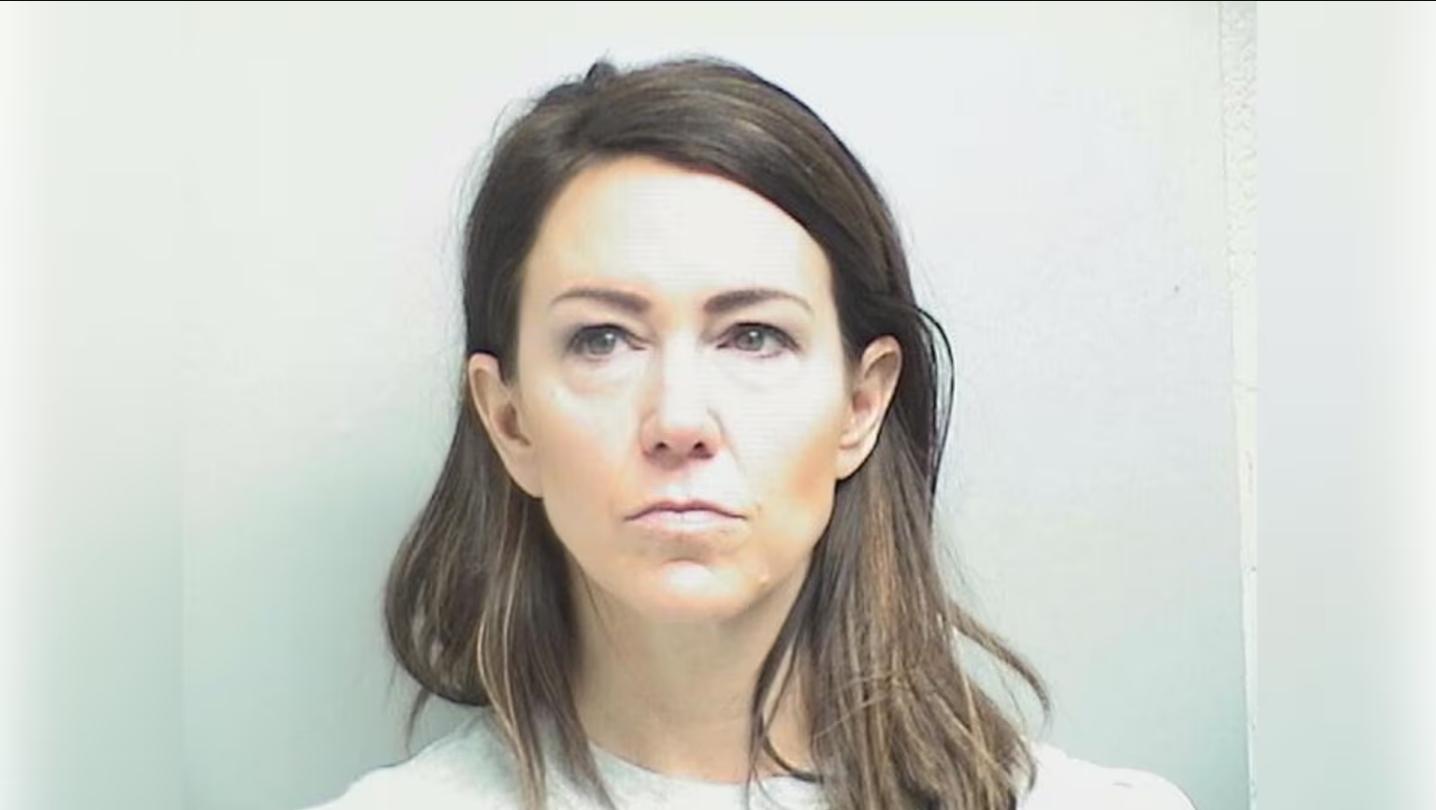
COLLIERVILLE, Tenn. – A Collierville Schools board member backed by anti-LGBTQ+ extremist group Moms for Liberty has resigned after being charged with seven counts of property theft from the Collierville Target retail store located at 325 New Byhalia Rd.
Keri Leigh Blair, 43, was booked into the Shelby County jail Friday, January 5, charged by Collierville Police of shoplifting at Target seven times over a 26-day period on November 25, 30, and then on December 3, 6, 13, 18, 20. According to police, Blair stole $728.61 worth of merchandise by “skip scanning items at the self-checkout.” She would arrive each time in the same car and used a debit card in her name, arrest records show.
The amounts ranged from $63.38-$140.49 and the investigation was launched on Dec. 27, a week after her last alleged theft. She was released from custody on a $7,500 bond.
In a statement the Collierville Schools announced Wednesday, Jan. 10, 2024, that Blair had resigned the day before as a school board member:
Late yesterday afternoon, School Board Chairman Wright Cox received notice from Board Member Keri Blair of her resignation from the Board of Education for personal, family reasons. Ms. Blair was serving her first term, having been elected to School Board Position 4 in November 2022. Chairman Cox wishes to express his thanks for Ms. Blair’s service to the community and her commitment to public education in Collierville.
State law requires that Ms. Blair’s replacement be appointed by the Collierville Board of Mayor and Aldermen (BMA). The BMA has worked closely with the Board of Education in the past when selecting a new board member, and the School Board looks forward to continuing in this spirit of cooperation. The appointed board member will serve in the position until the next municipal election on November 5, 2024.
Blair ran her 2022 campaign as a conservative campaign supporting parent choice and with criticism of perceived “social agendas” in public education, The Memphis Commercial Appeal reported.
For the most part, Blair self-financed her campaign but also received contributions from community members including Patricia Woodard, treasurer for the Shelby County chapter of Moms for Liberty. The national conservative political group has grown in recent years and successfully supported school board candidates in recent elections, the Memphis Commercial Appeal noted.
Tennessee
Tennessee lawmaker files bill to ban ‘political agenda’ Pride flag
Latest effort to ban Pride flags leads to the possibility Tenn. could be one of the first states to ban political flags in all public schools
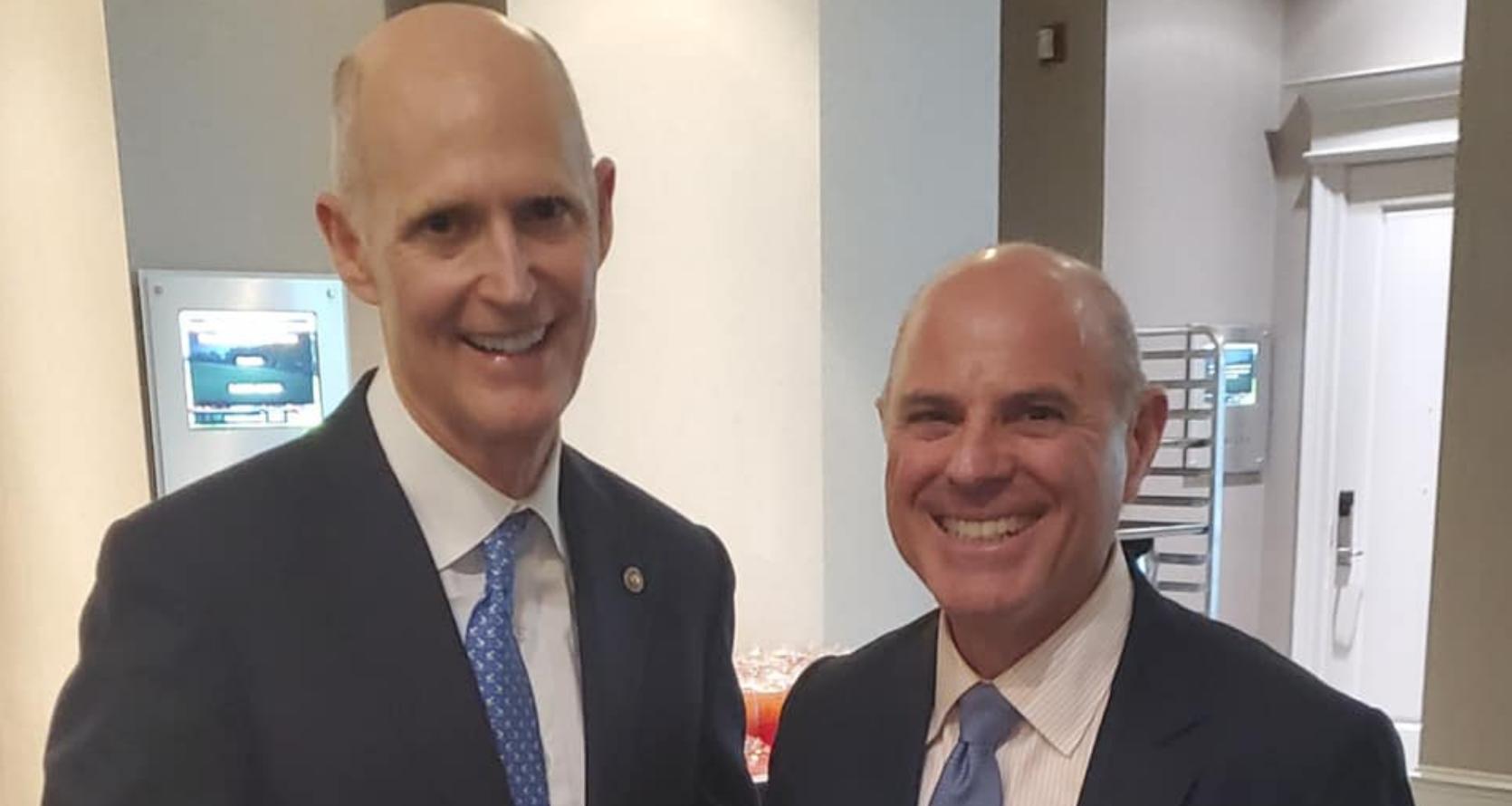
NASHVILLE, Tenn. – Republican State Rep. Gino Bulso (R-Brentwood) has filed a bill to ban all flags in schools that aren’t the official Tennessee or United States flag.
In an interview with ABC News affiliate WKRN 2 in Nashville, Bulso said that he filed the proposed measure after discussions with his constituents who expressed concern over the LGBTQ+ Pride flags displayed in classrooms.
“I had some complaints from Williamson County parents and a Williamson County School Board member, in particular, about pride flags in some of our schools in Williamson County,” Bulso told WKRN. “The whole idea is that a school is a place where a child goes to learn, not a place where a child goes to be indoctrinated. So you’re focusing on just one purpose of the bill having to do with political statements regarding transgender ideology and other similar issues.”
“Certainly, you know, 50 years ago we had a consensus on what marriage is; we don’t have that anymore. One-hundred years ago, we had a consensus on sexual morality; I don’t think we have that anymore. So the values that I think most parents want their children exposed to are the ones that were in existence at the time that our country was founded,” he added.
The Republican lawmaker, a trial lawyer specializing in Real Estate, on his campaign website claims that he is staunchly pro-life and pro-family. In 1992, he founded the National Lawyers Association a national association of pro-life attorneys to advocate for the unborn rights and battle abortion rights.
Bulso told WKRN that the pride and trans flag represent ideas he disagrees with, like the 2015 Supreme Court Obergefell v Hodges decision, saying the 14th Amendment requires states recognize same-sex marriage.
“That’s one issue that I think that flag represents this idea that, somehow, the 14 Amendment has an equal protection clause that extends this protection, which is obviously something I very much disagree with,” Bulso told WKRN. “And I think a lot of parents and I would be included in that group, really think that this transgender ideology is probably the most dangerous one that comes under that pride flag.”
He conceded that the measure is subject to amending as it works its way through the legislative process, but he told WKRN state flags or flags from other countries will likely be added as exceptions, but not ones that promote an “agenda,” like the Pride flag or Black Lives Matter flag.
Brian Sullivan of the Tennessee Equality Project told WKRN they are already watching this bill and is nervous about its broad implications and the message it sends to students.
“We live here; this is our home; this is our state; the capitol is as much our building as it is anyone else’s, and we’re not going anywhere,” Sullivan said.
In a recent open letter, the American Civil Liberties Union labeled efforts by lawmakers and others such as school boards in numerous jurisdictions a disturbing trend.
“The U.S. Constitution also guarantees robust free expression rights upon which the flag bans unlawfully infringe. While speech in public schools may be subject to more restrictions than other arenas, the Supreme Court has repeatedly held that First Amendment protections extend to ‘teachers and students,’” ACLU attorney Li Nowlin-Sohl wrote.
Related:
Tennessee
Ordinance banning public homosexuality reaches libraries
In Murfreesboro, Tennessee, a new city ordinance targeting public homosexuality is hitting libraries targeting LGBTQ+ books
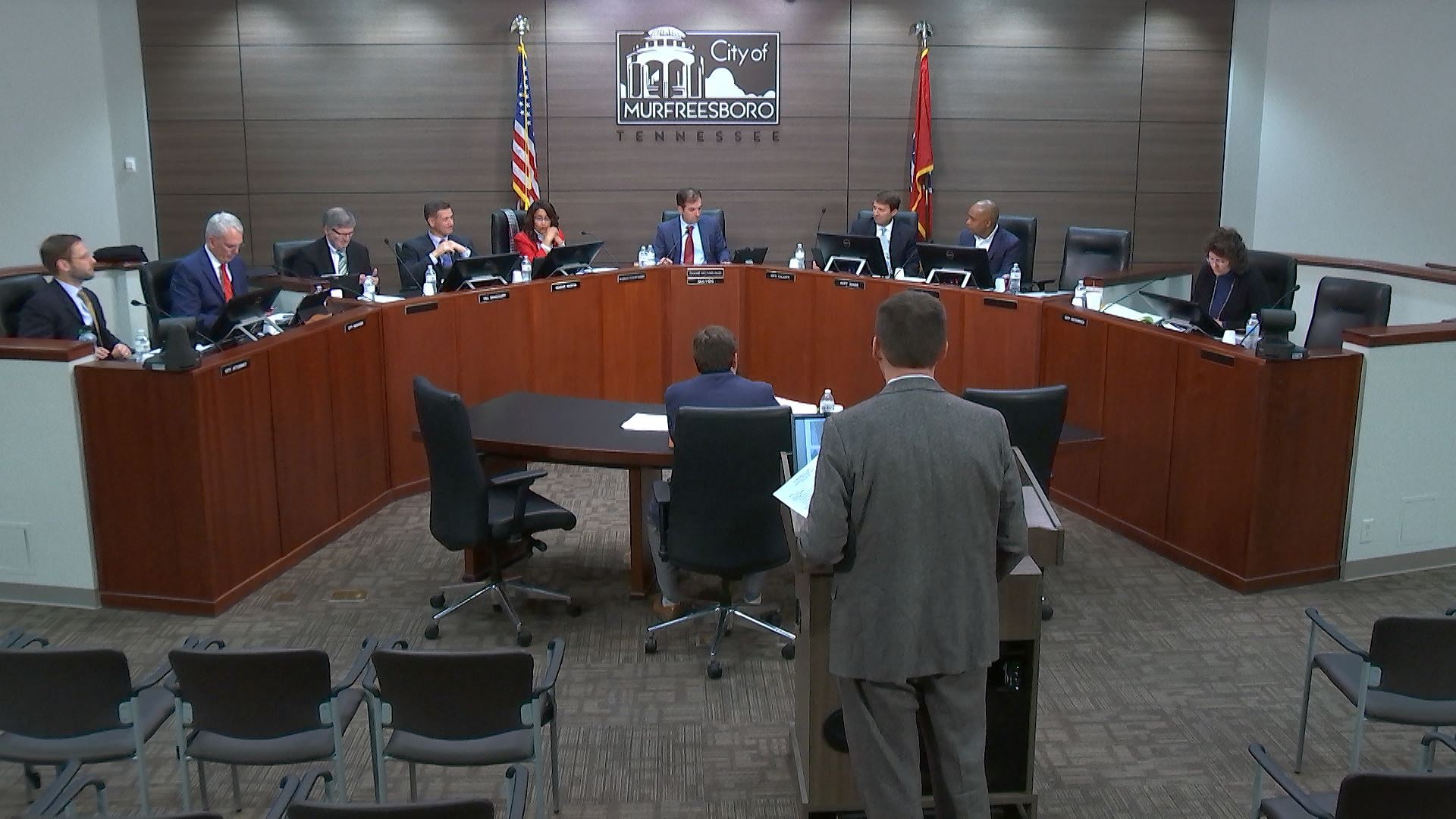
By Erin Reed | MURFREESBORO, Tenn. – A municipal mandate enacted this past June in Murfreesboro, Tennessee, is now being used to target books in the local library system. The ordinance, outlawing “indecent behavior” in public and prohibiting “indecent materials,” is alarmingly vague in its delineation of indecency.
This definition used in the law links back to a city statute that explicitly bans public homosexuality or materials promoting homosexuality. The code has already been used to target local Pride events. Now, the code’s enforcement has reached the local library system, where at least four books, all containing LGBTQ+ themes, have been pulled from the shelves.
The ordinance in question is city ordinance 23-O-22. The ordinance states that the community “has the right to establish and preserve contemporary community standards.” It goes on to state that “indecent behavior” or “display” of “indecent materials” would be banned by the new provision.
Importantly, the definitions of indecency link back to the city codes definition in section 21-71 of Murfreesboro city codes, which states that “sexual conduct” barred under the provisions includes “homosexuality.”
The city ordinance further states that any “behaviors, materials or events that are patently offensive to the adult community” in Murfreesboro would also be banned. Finally, it gives police officers the right to enforce the provisions and states that anybody using city funds for the banned events or materials could be charged with further crimes.
You can see the particular provisions in the ordinance here:
Though the ordinance was not immediately enforced, in recent months, various city officials have begun using it to target the LGBTQ+ community in a variety of ways. The Rutherford County Library Board, chiefly composed of appointees from Murfreesboro’s city council and the Rutherford County Commission, met in August to remove books that might infringe upon the new statute.
At a packed meeting in August, library authorities resolved to withdraw four titles: “Flamer,” “Let’s Talk About It,” “Queerfuly & Wonderfully Made,” and “This Book Is Gay,” all of which feature LGBTQ+ content. Following that, the council moved to enact a tiered library card system, where most nonfiction content will be gated behind the adult-only library card. This system will go into effect in 2024.
On Monday, however, the library board met to discuss a new resolution: the removal of all books in the library that could possibly violate the Murfreesboro ordinance. The fiery meeting featured multiple board members stating that they had the right to “enforce community standards” and ban books. Speeches against the proposal were passionate, including one passionate speech by local activist Keri Lambert, who pointed out that the law was already being challenged in court and asked, “when have the people who ban books ever been the good guys?”
November 2023 Steering Committee Meeting:
The attacks on the library system have not been the only usage of the new city ordinance. According to court filings challenging the ordinance, in 2022, Mufreesboro City Manager Craig Tindall stated that he would refuse permits to BoroPride after claiming that the Pride festival “intentionally exposed children” to sexual conduct. Meanwhile, according to the filing, the city council crafted a ruling behind the scenes to target LGBTQ+ events and material. Specifically, they connected the new provisions to a 1977 definition of obscenity that included homosexual conduct:
- “Still worse, the Ordinance incorporates an earlier provision that defines ‘indecent behavior’ as including not simply masturbation and sexual intercourse (which most would agree are inappropriate in public), but also any acts of ‘homosexuality’ as a whole. Thus, under the Ordinance and the incorporated definition, any acts that are ‘homosexual’ in nature or any material or event even suggesting homosexuality, could be considered indecent and subject to civil and criminal penalties.”
The challenge to the ordinance is under way by American Civil Liberties Union of Tennessee, ACLU, Ballard Spahr, and Burr Forman on behalf of BoroPride, which was allowed to go forward after organizers reached an agreement with the city government.
Tennessee’s legislative landscape this year has been marked by the passage of several anti-LGBTQ+ statutes, particularly those banning gender affirming care and drag performances. While the ban on gender-affirming care has been upheld by the 6th Circuit Court of Appeals, the prohibition of drag shows has been blocked as unconstitutional.
Meanwhile, local governments have been reactivating decades-old obscenity laws in attempts to ban LGBTQ+ expression. The ordinance in Murfreesboro is the latest manifestation of an ongoing campaign targeting LGBTQ+ rights, signaling a broader trend of restrictions to free speech and expression for the community within the state.
****************************************************************************

Erin Reed is a transgender woman (she/her pronouns) and researcher who tracks anti-LGBTQ+ legislation around the world and helps people become better advocates for their queer family, friends, colleagues, and community. Reed also is a social media consultant and public speaker.
Follow her on Twitter (Link)
Website here: https://www.erininthemorning.com/
******************************************************************************************
The preceding article was first published at Erin In The Morning and is republished with permission.
Tennessee
Olivia Hill is elected as first Out trans official in Tennessee
A Nashville native, Hill graduated from Hillwood High School in 1983. She served in the U.S. Navy and saw combat overseas during Desert Storm

NASHVILLE, Tenn. – Voters in the City of Nashville and surrounding Davidson County made history Thursday as Olivia Hill won an at-large seat on the Metro Council, making her the first openly transgender official elected to public office in “the Volunteer State.”
The Tennessean reported that Hill secured one of the Council’s five at-large seats in Thursday’s runoff election with 12.9% of the vote, as of 10 p.m. Thursday night. She joins a historic number of women elected to the Council. All five at-large members will be women, as well as 17 district councilmembers. That adds up to 22 women — a majority of the 40-member council.
“I want to say that I am elated,” Hill told The Tennessean after the historic win. A Nashville native, Hill graduated from Hillwood High School in 1983. She then served in the U.S. Navy from 1986-1995 and saw combat overseas during Desert Storm.
Mayor Annise Parker, President & CEO of LGBTQ+ Victory Fund, released the following statement after Hill was elected:
“Nashville voters clearly reject the hateful rhetoric that has grown louder in Tennessee politics lately. Olivia’s victory proves that transgender people belong everywhere decisions about them are being made, including local office. I know Olivia is well-prepared to take her seat on the Metro Council and work to make Nashville and Davidson County a more welcoming place for all.”
The Metropolitan Council (officially the Metropolitan Council of Nashville and Davidson County) is the legislative body of the consolidated city-county government of Nashville, Tennessee and Davidson County.
-

 News2 days ago
News2 days agoWest Hollywood to advance protections for diverse and non-nuclear families
-

 Commentary4 days ago
Commentary4 days agoThe Supreme Court’s ‘Don’t Read Gay’ ruling
-

 Arts & Entertainment3 days ago
Arts & Entertainment3 days ago2025 Emmy nominations: ‘Hacks’ and ‘The Last of Us’ bring queer excellence to the table
-

 a&e features4 days ago
a&e features4 days agoThe art of controlled chaos: Patrick Bristow brings the Puppets to life
-

 Movies3 days ago
Movies3 days ago‘Superman’ is here to to save us, despite MAGA backlash
-

 Sports3 days ago
Sports3 days agoHololive and Dodgers create a home for queer fandom
-

 Events2 days ago
Events2 days agoLos Angeles Blade to take special part in NLGJA Los Angeles inaugural journalism awards
-

 Features2 hours ago
Features2 hours agoTS Madison Starter House offers a blueprint for Black, trans liberation








